- Home
- Patricia Highsmith
Strangers on a Train Page 4
Strangers on a Train Read online
Page 4
“Hello, Guy.” Miriam smiled and quickly closed her broad orangey-pink lips. Because of the space between her front teeth, Guy remembered.
“How are you, Miriam?” Involuntarily he glanced at her figure, plump but not pregnant looking, and it flashed through his mind she might have lied. She wore a brightly flowered skirt and a white short-sleeved blouse. Her big white pocketbook was of woven patent leather.
She sat down primly on the one stone bench that was in the shade, and asked him dull questions about his trip. Her face had grown fuller where it had always been full, on the lower cheeks, so that her chin looked more pointed. There were little wrinkles under her eyes now, Guy noticed. She had lived a long time, for twenty-two.
“In January,” she answered him in a flat voice. “In January the child’s due.”
It was two months advanced then. “I suppose you want to marry him.”
She turned her head slightly and looked down. On her short cheek, the sunlight picked out the largest freckles, and Guy saw a certain pattern he remembered and had not thought of since a time when he had been married to her. How sure he had once been that he possessed her, possessed her every frailest thought! Suddenly it seemed that all love was only a tantalizing, a horrible next-best to knowing. He knew not the smallest part of the new world in Miriam’s mind now. Was it possible that the same thing could happen with Anne?
“Don’t you, Miriam?” he prompted.
“Not right now. See, there’re complications.”
“Like what?”
“Well, we might not be able to marry as soon as we’d like to.”
“Oh.” We. He knew what he would look like, tall and dark, with a long face, like Steve. The type Miriam had always been attracted to. The only type she would have a child by. And she did want this child, he could tell. Something had happened, that had nothing to do with the man, perhaps, that made her want a child. He could see it in the prim, stiff way she sat on the bench, in that self-abandoned trance he had always seen or imagined in pregnant women’s faces. “That needn’t delay the divorce though, I suppose.”
“Well, I didn’t think so—until a couple of days ago. I thought Owen would be free to marry this month.”
“Oh. He’s married now?”
“Yeah, he’s married,” she said with a little sigh, almost smiling.
Guy looked down in vague embarrassment and paced a slow step or two on the asphalt. He had known the man would be married. He had expected he would have no intention of marrying her unless he were forced to. “Where is he? Here?”
“He’s in Houston,” she replied. “Don’t you want to sit down?”
“No.”
“You never did like to sit down.”
He was silent.
“Still have your ring?”
“Yes.” His class ring from Chicago, that Miriam had always admired because it meant he was a college man. She was staring at the ring with a self-conscious smile. He put his hands in his pockets. “As long as I’m here, I’d like it settled. Can we do it this week?”
“I want to go away, Guy.”
“For the divorce?”
Her stubby hands opened in a limp ambiguous gesture, and he thought suddenly of Bruno’s hands. He had forgotten Bruno completely, getting off the train this morning. And his book.
“I’m sort of tired of staying here,” she said.
“We can get the divorce in Dallas if you like.” Her friends here knew, he thought, that was all.
“I want to wait, Guy. Would you mind? Just a while?”
“I should think you’d mind. Does he intend to marry you or not?”
“He could marry me in September. He’d be free then, but—”
“But what?” In her silence, in the childlike lick of her tongue on her upper lip, he saw the trap she was in. She wanted this child so much, she would sacrifice herself in Metcalf by waiting until four months before it was born to marry its father. In spite of himself, he felt a certain pity for her.
“I want to go away, Guy. With you.”
There was a real effort at sincerity in her face, so much that he almost forgot what she was asking, and why. “What is it you want, Miriam? Money to go away somewhere?”
The dreaminess in her gray-green eyes was dispersing like a mist. “Your mother said you were going to Palm Beach.”
“I might be going there. To work.” He thought of the Palmyra with a twinge of peril. It was slipping away already.
“Take me with you, Guy? It’s the last thing I’ll ask you. If I could stay with you till December and then get the divorce—”
“Oh,” he said quietly, but something throbbed in his chest, like the breaking of his heart. She disgusted him suddenly, she and all the people around her whom she knew and attracted. Another man’s child. Go away with her, be her husband until she gave birth to another man’s child. In Palm Beach!
“If you don’t take me, I’ll come anyway.”
“Miriam, I could get that divorce now. I don’t have to wait to see the child. The law doesn’t.” His voice shook.
“You wouldn’t do that to me,” Miriam replied with that combination of threat and pleading that had played on both his anger and his love when he loved her, and baffled him.
He felt it baffling him now. And she was right. He wouldn’t divorce her now. But it was not because he still loved her, not because she was still his wife and was therefore due his protection, but because he pitied her and because he remembered he had once loved her. He realized now he had pitied her even in New York, even when she wrote him for money. “I won’t take the job if you come out there. There’d be no use in taking it,” he said evenly, but it was gone already, he told himself, so why discuss it?
“I don’t think you’d give up a job like that,” she challenged.
He turned away from her twisted smile of triumph. That was where she was wrong, he thought, but he was silent. He took two steps on the gritty asphalt and turned again, with his head high. Be calm, he told himself. What could anger accomplish? Miriam had used to hate him when he reacted like this, because she loved loud arguments. She would love one even this morning, he thought. She had hated him when he reacted like this, until she had learned that in the long run it hurt him more to react like this. He knew he played into her hands now, yet he felt he could react in no other way.
“I haven’t even got the job yet, you know. I’ll simply send them a telegram saying I don’t want it.” Beyond the treetops, he noticed again the new reddish building he had seen before Miriam came.
“And then what?”
“A lot of things. But you won’t know about them.”
“Running away?” she taunted. “Cheapest way out.”
He walked again, and turned. There was Anne. With Anne, he could endure this, endure anything. And in fact, he felt strangely resigned. Because he was with Miriam now, the symbol of the failure of his youth? He bit the tip of his tongue. There was inside him, like a flaw in a jewel, not visible on the surface, a fear and anticipation of failure that he had never been able to mend. At times, failure was a possibility that fascinated him, as at times, in high school and college, when he had allowed himself to fail examinations he might have passed; as when he married Miriam, he thought, against the will of both their families and all their friends. Hadn’t he known it couldn’t succeed? And now he had given up his biggest commission, without a murmur. He would go to Mexico and have a few days with Anne. It would take all his money, but why not? Could he possibly go back to New York and work without having seen Anne first?
“Is there anything else?” he asked.
“I’ve said it,” she told him, out of her spaced front teeth.
four
He walked home slowly, approaching Ambrose Street, where he lived, through Travis Street, which was shaded and still. There was a small fruit shop now on the corner of Travis and Delancey Streets, sitting right on somebody’s front lawn like a children’s play store. Out of the great Washator
ium building that marred the west end of Ambrose Street, girls and women in white uniforms were pouring, chattering, on their way to an early lunch. He was glad he did not meet anyone on the street he had to speak to. He felt slow and quiet and resigned, and even rather happy. Strange how remote—perhaps how foreign—Miriam seemed five minutes after talking with her, how unimportant, really, everything seemed. Now he felt ashamed of his anxiety on the train.
“Not bad, Mama,” he said with a smile when he came home.
His mother had greeted him with an anxious lift of her eyebrows. “I’m glad to hear that.” She pulled a rocker around and sat down to listen. She was a small woman with light brown hair, with a pretty, rather fine straight-nosed profile still, and a physical energy that seemed to twinkle off in sparks now in the silver of her hair. And she was almost always cheerful. It was this fact chiefly that made Guy feel that he and she were quite different, that had estranged him from her somewhat since the time he had suffered from Miriam. Guy liked to nurse his griefs, discover all he could about them, while his mother counseled him to forget. “What did she say? You certainly weren’t gone very long. I thought you might have had lunch with her.”
“No, Mama.” He sighed and sank down on the brocade sofa. “Everything’s all right, but I’ll probably not take the Palmyra job.”
“Oh, Guy. Why not? Is she—? Is it true she’s going to have a child?”
His mother was disappointed, Guy thought, but so mildly disappointed, for what the job really meant. He was glad she didn’t know what the job really meant. “It’s true,” he said, and let his head go back until he felt the cool of the sofa’s wooden frame against the back of his neck. He thought of the gulf that separated his life from his mother’s. He had told her very little of his life with Miriam. And his mother, who had known a comfortable, happy upbringing in Mississippi, who kept herself busy now with her big house and her garden and her pleasant, loyal friends in Metcalf—what could she understand of a total malice like Miriam’s? Or, for instance, what could she understand of the precarious life he was willing to lead in New York for the sake of a simple idea or two about his work?
“Now what’s Palm Beach got to do with Miriam?” she asked finally.
“Miriam wants to come with me there. Protection for a time. And I couldn’t bear it.” Guy clenched his hand. He had a sudden vision of Miriam in Palm Beach, Miriam meeting Clarence Brillhart, the manager of the Palmyra Club. Yet it was not the vision of Brillhart’s shock beneath his calm, unvarying courtesy, Guy knew, but simply his own revulsion that made it impossible. It was just that he couldn’t bear having Miriam anywhere near him when he worked on a project like this one. “I couldn’t bear it,” he repeated.
“Oh,” was all she said, but her silence now was one of understanding. If she made any comment, Guy thought, it was bound to remind him of her old disapproval of their marriage. And she wouldn’t remind him at this time. “You couldn’t bear it,” she added, “for as long as it would take.”
“I couldn’t bear it.” He got up and took her soft face in his hands. “Mama, I don’t care a bit,” he said, kissing her forehead. “I really don’t care a row of beans.”
“I don’t believe you do care. Why don’t you?”
He crossed the room to the upright piano. “Because I’m going to Mexico to see Anne.”
“Oh, are you?” she smiled, and the gaiety of this first morning with him won out. “Aren’t you the gadabout!”
“Want to come to Mexico?” He smiled over his shoulder. He began to play a saraband that he had learned as a child.
“Mexico!” his mother said in mock horror. “Wild horses wouldn’t get me to Mexico. Maybe you can bring Anne to see me on your way back.”
“Maybe.”
She went over and laid her hands shyly on his shoulders. “Sometimes, Guy, I feel you’re happy again. At the funniest times.”
five
What has happened? Write immediately. Or better, telephone collect. We’re here at the Ritz for another two weeks. Missed you so on the trip, seems a shame we couldn’t have flown down together, but I understand. I wish you well every moment of the day, darling. This must be over soon and we’ll get it over. Whatever happens, tell me and let’s face it. I often feel you don’t. Face things, I mean.
You’re so close, it’s absurd you can’t come down for a day or so. I hope you’ll be in the mood. I hope there’ll be time. Would love to have you here, and you know the family would. Darling, I do love the drawings and I’m so terribly proud of you I can even stand the idea of your being away in the months ahead because you’ll be building them. Dad most impressed, too. We talk about you all the time.
All my love, and all that goes
with it. Be happy, darling.
A.
Guy wrote a telegram to Clarence Brillhart, the manager of the Palmyra Club: “Owing to circumstances, impossible for me to take commission. My deepest regrets and thanks for your championing and constant encouragement. Letter following.”
Suddenly he thought of the sketches they would use in lieu of his—the imitation Frank Lloyd Wright of William Harkness Associates. Worse yet, he thought as he dictated the telegram over the phone, the board would probably ask Harkness to copy some of his ideas. And Harkness would, of course.
He telegraphed Anne that he would fly down Monday and that he was free for several days. And because there was Anne, he did not bother to wonder how many months it would be, how many years, perhaps, before another job as big as the Palmyra would come within his reach.
six
That evening, Charles Anthony Bruno was lying on his back in an El Paso hotel room, trying to balance a gold fountain pen across his rather delicate, dished-in nose. He was too restless to go to bed, not energetic enough to go down to one of the bars in the neighborhood and look things over. He had looked things over all afternoon, and he did not think much of them in El Paso. He did not think much of the Grand Canyon either. He thought more of the idea that had come to him night before last on the train. A pity Guy hadn’t awakened him that morning. Not that Guy was the kind of fellow to plan a murder with, but he liked him, as a person. Guy was somebody worth knowing. Besides, Guy had left his book, and he could have given it back.
The ceiling fan made a wuz-wuz-wuz sound because one of its four blades was missing. If the fourth had been there, he would have been just a little cooler, he thought. One of the taps in the john leaked, the clamp on the reading light over the bed was broken so it hung down, and there were fingerprints all over the closet door. And the best hotel in town, they told him! Why was there always something wrong, maybe only one thing, with every hotel room he had ever been in? Some day he was going to find the perfect hotel room and buy it, even if it was in South Africa.
He sat up on the edge of the bed and reached for the telephone. “Gimme long-distance.” He looked blankly at a smudge of red dirt his shoe had put on the white counterpane. “Great Neck 166J . . . Great Neck, yeah.” He waited. “Long Island . . . In New York, lunk, ever hear of it?”
In less than a minute, he had his mother.
“Yeah, I’m here. You still leaving Sunday? You better. . . . Well, I took that muleback trip. Just about pooped me, too. . . . Yeah, I seen the canyon. . . . Okay, but the colors are kind of corny. . . . Anyhow, how’s things with you?”
He began to laugh. He pushed off his shoes and rolled back on the bed with the telephone, laughing. She was telling him about coming home to find the Captain entertaining two of her friends—two men she had met the night before—who had dropped in, thought the Captain was her father, and proceeded to say all the wrong things.
seven
Propped on his elbow in bed, Guy stared at the letter addressed to him in pencil.
“Guess I’ll have only one more time to wake you for another good long while,” his mother said.
Guy picked up the letter from Palm Beach, “Maybe not so long, Mama.”
“What time does your plane lea
ve tomorrow?”
“One-twenty.”
She leaned over and superfluously tucked in the foot of his bed. “I don’t suppose you’ll have time to run over and see Ethel?”
“Oh, certainly I will, Mama.” Ethel Peterson was one of his mother’s oldest friends. She had given Guy his first piano lessons.
The letter from Palm Beach was from Mr. Brillhart. He had been given the commission. Mr. Brillhart had also persuaded the board about the louver windows.
“I’ve got some good strong coffee this morning,” his mother said from the threshold. “Like breakfast in bed?”
Guy smiled at her. “Would I!”
He reread Mr. Brillhart’s letter carefully, put it back in its envelope, and slowly tore it up. Then he opened the other letter. It was one page, scrawled in pencil. The signature with the heavy flourish below it made him smile again: Charles A. Bruno.
Dear Guy:
This is your train friend, remember? You left your book in my room that night & I found a Texas address in it which I trust is still right. Am mailing book to you. Read some in it myself, didn’t know there was so much conversation in Plato.
A great pleasure dining with you that night & hope I may list you among my friends. It would be fine to see you in Santa Fe & if you possibly change your mind, address is: Hotel La Fonda, Santa Fe, New Mex. for next two weeks at least.

 Small G: A Summer Idyll
Small G: A Summer Idyll The Boy Who Followed Ripley
The Boy Who Followed Ripley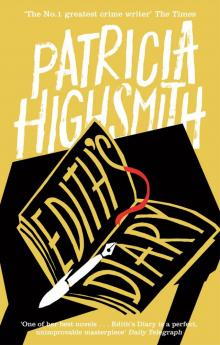 Edith's Diary
Edith's Diary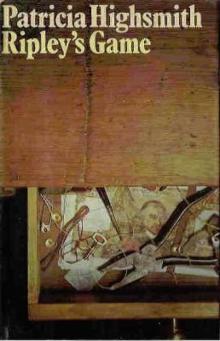 Ripley's Game
Ripley's Game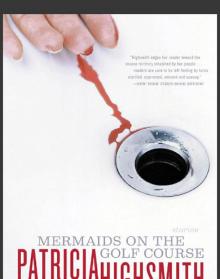 Mermaids on the Golf Course: Stories
Mermaids on the Golf Course: Stories Slowly, Slowly in the Wind
Slowly, Slowly in the Wind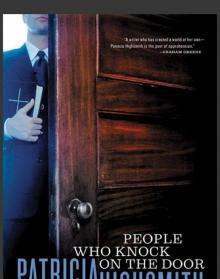 People Who Knock on the Door
People Who Knock on the Door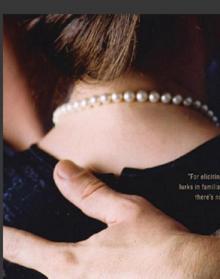 The Glass Cell
The Glass Cell The Blunderer
The Blunderer Those Who Walk Away
Those Who Walk Away A Suspension of Mercy
A Suspension of Mercy Eleven
Eleven Found in the Street
Found in the Street Ripley Under Ground
Ripley Under Ground The Black House
The Black House The Cry of the Owl
The Cry of the Owl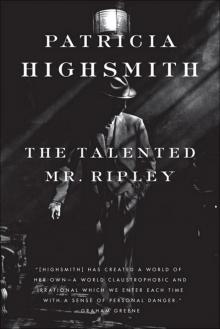 The Talented Mr. Ripley
The Talented Mr. Ripley This Sweet Sickness
This Sweet Sickness The Two Faces of January
The Two Faces of January The Animal-Lover's Book of Beastly Murder
The Animal-Lover's Book of Beastly Murder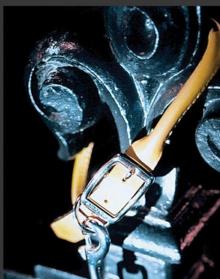 A Dog's Ransom
A Dog's Ransom Deep Water
Deep Water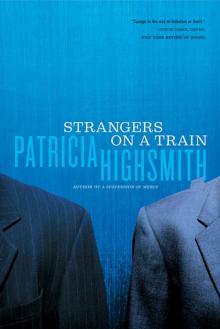 Strangers on a Train
Strangers on a Train Ripley Under Water
Ripley Under Water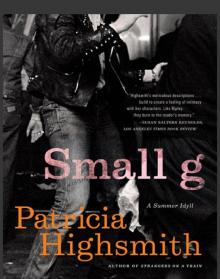 Small g
Small g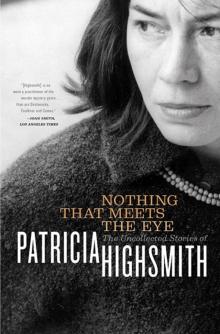 Nothing That Meets the Eye
Nothing That Meets the Eye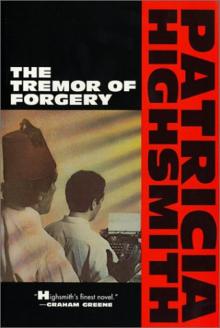 Patricia Highsmith - The Tremor of Forgery
Patricia Highsmith - The Tremor of Forgery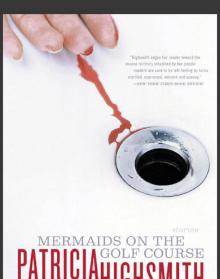 Mermaids on the Golf Course
Mermaids on the Golf Course Suspension of Mercy
Suspension of Mercy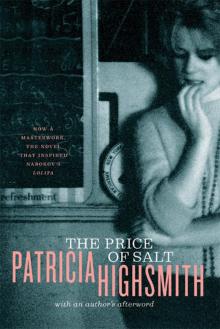 The Price of Salt, or Carol
The Price of Salt, or Carol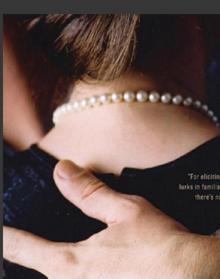 Glass Cell
Glass Cell